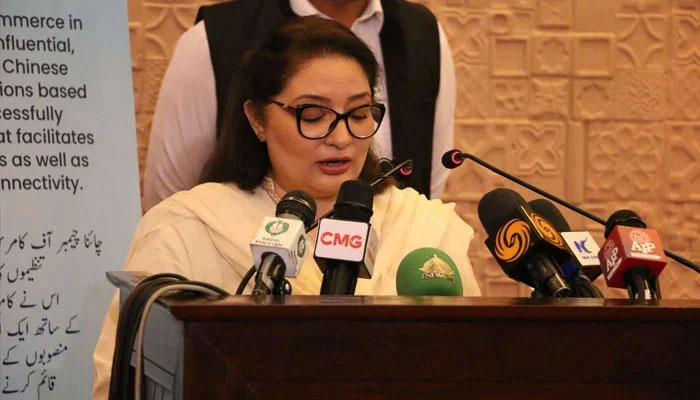Efforts for bringing global judicial fraternity together for climate justice lauded
Islamabad : Coordinator to the Prime Minister for Climate Change, Romina Khurshid Alam has emphasized the need for vulnerable countries to come together and unite in the fight for climate justice.
She made these remarks in the context of a high-level ‘Judicial Pathways Towards Climate Justice: Judicial Approaches for Addressing Climate Change Through Global Analysis’ held on Friday at the Pakistan Pavilion on the sidelines of the UN-led global climate summit.
The Prime Minister's climate aide revealed that it was basically her initiative to establish a platform for international judges dedicated to climate justice as a part of Pakistan’s push for climate finance for global south and today’s event was an step towards that objective.
Alam explained, “I am pleased to have successfully organised a panel discussion that brought together judges to explore the crucial and expanding role of courts in tackling climate change in the Asia-Pacific region.”
She further highlighted the growing importance of judicial systems in the face of escalating climate impacts, noting that courts have become vital spaces for addressing climate justice. These judicial bodies are tasked with balancing the urgent environmental challenges with the socio-economic and developmental needs, particularly in the Global South, where such issues are especially pressing, Romina Khurshid Alam added.
In the high-powered panel discussion at the Pakistan Pavilion on the sidelines of COP29, global judicial leaders, alongside Pakistan’s climate experts, emphasised the critical role of the judiciary in addressing the climate crisis and ensuring climate justice. The judicial experts highlighted the urgent need for a global judicial coalition to hold governments and corporations accountable in the fight against climate change and demand financial flows from global north to global south.
Senator Sherry Rehman, Chairperson of Pakistan’s Senate Standing Committee on Climate Change, opened the discussion with a stark reminder of the growing climate crisis. She stressed that while Pakistan contributes less than one percent of global carbon emissions, it remains one of the most vulnerable nations to climate-related disasters, including the catastrophic 2022 floods that affected one-third of the country.
Senator Rehman underscored the growing gap in climate finance and the need for an equitable distribution of resources to help vulnerable nations adapt to the impacts of climate change. “The tool that will unlock justice for the Global South is climate finance,” she said. “But the financing gap is widening, and the Global South is being left behind.” The panel, which featured prominent judges and legal experts from around the world, explored how judicial systems can play a pivotal role in advancing climate justice. Justice Mansoor Ali Shah of the Supreme Court of Pakistan, who chaired the session, emphasized that climate finance is now a fundamental human right.
He lauded the Prime Minister's Coordinator for Climate Change, Romina Khurshid Alam, for organising a panel discussion on judicial approaches to addressing climate change in the Asia-Pacific region. “Without climate finance, there is no mitigation or adaptation,” he stated. “It is the lifeline for climate resilience, and the Global South cannot bear the burden alone.” Justice Shah also discussed Pakistan’s pioneering legal framework on climate change, highlighting the country’s landmark judgments on holding corporations accountable and stopping environmentally harmful development projects.
-
 Harry Styles Opens Up About Isolation After One Direction Split
Harry Styles Opens Up About Isolation After One Direction Split -
 Shamed Andrew Was ‘face To Face’ With Epstein Files, Mocked For Lying
Shamed Andrew Was ‘face To Face’ With Epstein Files, Mocked For Lying -
 Kanye West Projected To Explode Music Charts With 'Bully' After He Apologized Over Antisemitism
Kanye West Projected To Explode Music Charts With 'Bully' After He Apologized Over Antisemitism -
 Leighton Meester Reflects On How Valentine’s Day Feels Like Now
Leighton Meester Reflects On How Valentine’s Day Feels Like Now -
 Sarah Ferguson ‘won’t Let Go Without A Fight’ After Royal Exile
Sarah Ferguson ‘won’t Let Go Without A Fight’ After Royal Exile -
 Adam Sandler Makes Brutal Confession: 'I Do Not Love Comedy First'
Adam Sandler Makes Brutal Confession: 'I Do Not Love Comedy First' -
 'Harry Potter' Star Rupert Grint Shares Where He Stands Politically
'Harry Potter' Star Rupert Grint Shares Where He Stands Politically -
 Drama Outside Nancy Guthrie's Home Unfolds Described As 'circus'
Drama Outside Nancy Guthrie's Home Unfolds Described As 'circus' -
 Marco Rubio Sends Message Of Unity To Europe
Marco Rubio Sends Message Of Unity To Europe -
 Savannah's Interview With Epstein Victim, Who Sued UK's Andrew, Surfaces Amid Guthrie Abduction
Savannah's Interview With Epstein Victim, Who Sued UK's Andrew, Surfaces Amid Guthrie Abduction -
 Piers Morgan Supports Bad Bunny As US Lawmakers Seek Action
Piers Morgan Supports Bad Bunny As US Lawmakers Seek Action -
 Jennifer Love Hewitt Reminisces About Workign With Betty White
Jennifer Love Hewitt Reminisces About Workign With Betty White -
 Hilarie Burton Reveals Valentine's Day Plans With Jeffrey Dean Morgan
Hilarie Burton Reveals Valentine's Day Plans With Jeffrey Dean Morgan -
 Harry Styles Silently Deleted Instagram App
Harry Styles Silently Deleted Instagram App -
 Cardi B Compares Her Fall To Government At Las Vegas Show
Cardi B Compares Her Fall To Government At Las Vegas Show -
 Harry Styles Reveals Biggest Lesson Learnt During Music Hiatus
Harry Styles Reveals Biggest Lesson Learnt During Music Hiatus




